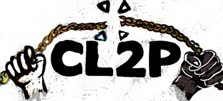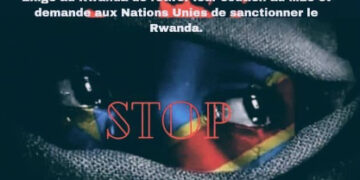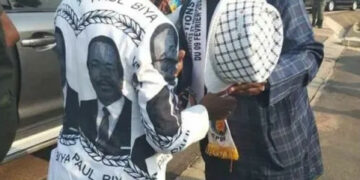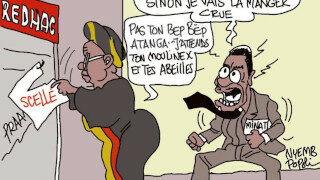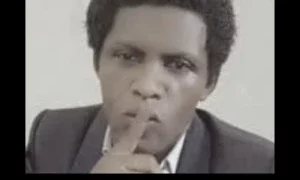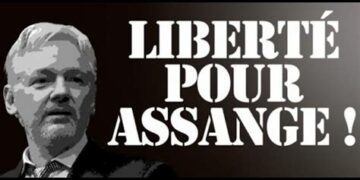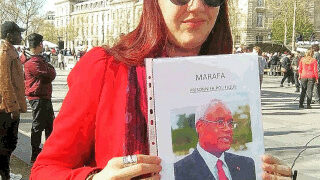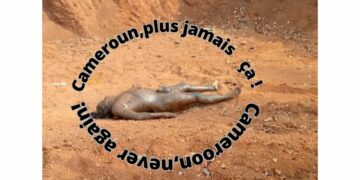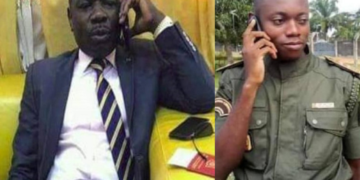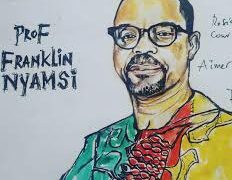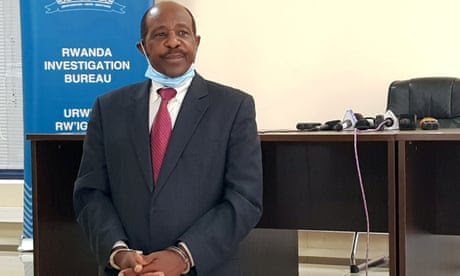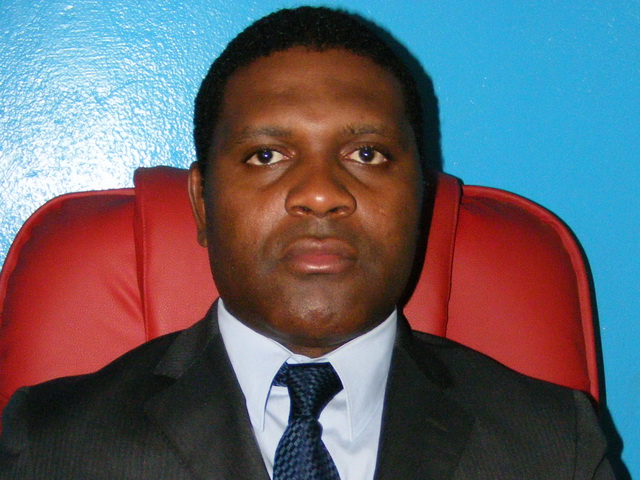Lawyers for Paul Rusesabagina have called on a UN investigator to immediately intervene in the case of the human rights activist – and inspiration behind the film Hotel Rwanda – who is being detained in Rwanda and is alleged to face a “serious risk of torture”.
The letter to Nils Melzer, the special rapporteur on torture, comes one week after Rusesabagina, a prominent critic of the Rwandan president, Paul Kagame, was revealed to have been brought to Kigali from Dubai in what his lawyers have called an illegal rendition.
Rusesabagina is a Belgian citizen and a permanent US resident, but his lawyer, Jared Genser, said he had not had contact with any of his own approved lawyers, Belgian diplomats, or his family since he was last seen paraded before television cameras last Monday in handcuffs and accused of terrorism-related offences.

“Given these serious human rights violations, and the Rwandan government’s long-standing prior persecution of Mr Rusesabagina, he is at immediate and serious risk of torture or cruel, inhuman, or degrading treatment or punishment,” the letter said.
“We respectfully request that … you investigate the situation and immediately reach out to the government of Rwanda, urging it to provide proof that Mr Rusesabagina is still alive.”
At a press conference aired on national Rwandan TV, Kagame denied that Rusesabagina had been kidnapped and insisted that there had been “no wrongdoing in the process of his getting here”.
Suggesting that Rusesabagina had willingly gone to Rwanda, Kagame added: “He got here on the basis of what he believed he wanted to do and he found himself here.”
On Monday, Rusesabagina’s lawyers portrayed a far different series of events.
In a letter to the UN special rapporteur, Genser and Brian Tronic said the Kagame government had sought to “discredit, smear, and silence” Rusesabagina for decades because of his outspoken criticism of Kagame.
Rusesabagina gained international acclaim after he was credited with saving the lives of 1,268 Rwandans during the country’s genocide as the manager of one of Kigali’s luxury hotels, after he turned the Hotel Milles Collines into a safe haven for those seeking shelter from the slaughter. The story was later captured in the Hollywood film Hotel Rwanda.
Since then, his lawyers claim, Kagame’s government has sought to discredit Rusesabagina’s “acts of heroism” and has accused him of being a genocide denier, a claim his legal team denies. The persecution, they say, is part of a pattern of Rwanda’s aggressive pursuit of Kagame’s detractors, an assessment that is shared by human rights groups, including Human Rights Watch, which has documented forced disappearances and mysterious deaths of journalists and government critics.
On 26 August, Rusesabagina flew from Chicago to Dubai on an Emirates flight for a short trip – he was intending to go to meetings – and arrived in Dubai shortly after 7pm, his lawyers said. Later that night, at 11pm, he called his family to tell them he had arrived safely. It was the last time they heard from him.
Flight logs examined by the lawyers have identified a private jet that took off from Dubai’s Al Maktoum airport a few hours later – at 12.55am. They have said they believed it was “highly likely” that Rusesabagina was on the plane, a Bombardier Challenger that is operated by a company used by the Rwandan government.
Four days later, on 30 August, Rwandan authorities notified Belgium that it had detained a Belgian citizen but did not specify the person’s identity.
The lawyers for the dissident also strenuously denied allegations aired by Kagame that Rusesabagina was the head of a “group of terrorists” who have killed Rwandans. While a Rwandan lawyer, David Rugaza, has appeared in press conferences and claimed to represent Rusesabagina, his children have referred to him as a “fake lawyer” who had been chosen by Kagame’s people.
The case has highlighted what lawyer Jared Genser called the story of “two Rwandas”: the Rwanda that Kagame would like to “show the world”, which has made strides in the rights of women and girls, attracted foreign direct investment, and is supported by international figures like the former UK prime minister Tony Blair, and the “other” Rwanda that aggressively stamps out any challenge to Kagame.
In an interview with the Guardian, Genser – who is based in Washington DC – pointed to Blair’s longstanding public support of Kagame, and his heralding of Rwanda as a major African success story, saying such bolstering of the Rwandan president was “very, very helpful to tamp down criticism” of his alleged abuses of dissenters.
Blair’s organisation, the Tony Blair Institute for Global Change, devotes a page of its website to its work in Rwanda, and says the country has been built upon “visionary leadership” since the 1994 genocide, in which up to a million Tutsis, and moderate Hutus, were killed in violence largely carried out by the Hutu majority.
“Rwanda today is a nation on the rise, powered by resilience, shared values of solidarity, and a purposeful government,” the website states. It also says Kagame’s government sets “bold ambitions to improve the lives and livelihoods of Rwandans”.
The institute did not respond to a Guardian request for comment on its support of Kagame or of Rusesabagina’s detention and alleged rendition.
Nils Melzer, the UN rapporteur, could not immediately be reached for comment.
Since you’re here …
… joining us from France, we have a small favour to ask. You’ve read
in the last year. And you’re not alone; millions are flocking to the Guardian for quality news every day. We believe everyone deserves access to factual information, and analysis that has authority and integrity. That’s why, unlike many others, we made a choice: to keep Guardian reporting open for all, regardless of where they live or what they can afford to pay.
As an open, independent news organisation we investigate, interrogate and expose the actions of those in power, without fear. With no shareholders or billionaire owner, our journalism is free from political and commercial bias – this makes us different. We can give a voice to the oppressed and neglected, and stand in solidarity with those who are calling for a fairer future. With your help we can make a difference.
We’re determined to provide journalism that helps each of us better understand the world, and take actions that challenge, unite, and inspire change – in times of crisis and beyond. Our work would not be possible without our readers, who now support our work from 180 countries around the world.
The Guardian
[spacer style="1"]
L’étrange arrestation du héros d’«Hôtel Rwanda»
Paul Rusesabagina a été arrêté lundi au Rwanda dans des circonstances étranges alors qu’il vivait en exil. Auréolé d’une image de Juste pour avoir sauvé plus de 1000 Tutsis lors du génocide de 1994, l’homme, dont l’héroïsme est remis en question, est poursuivi pour terrorisme.
La nouvelle est tombée il y a une semaine, avec un simple tweet de Rwanda investigation bureau (RIB). Le FBI rwandais annonce en une poignée de signes et une photo l’arrestation de Paul Rusesabagina, menottes aux poignets. Le choc est immense. Paul Rusesabagina n’est pas n’importe qui. Opposant au président Paul Kagame, qui l’accuse de soutenir et de diriger des mouvements armés hostiles à son régime, il est aussi celui qui dont la vie a inspiré le film Hôtel Rwanda. Surtout, il vivait depuis plus de 20 ans loin de Kigali, entre la Belgique, dont il a la nationalité, et les États-Unis. La façon dont cet homme, qui se savait visé par un mandat d’arrêt rwandais, est tombé aux mains du RIB est un mystère. Comme est un mystère la réalité de sa conduite pendant le génocide des Tutsis en 1994, où les récits hésitent entre un héros parfait et un profiteur cynique.
Dans cette affaire, il y a donc peu de certitudes ; sauf peut-être une: Paul Rusesabagina, 66 ans, ne retrouvera pas la liberté de sitôt. La liste des accusations est longue. Elle comporte la «constitution d’un groupe armé illégal», celle de terrorisme mais aussi celles de «meurtres», de «vol à main armée» et «d’incendie criminel». Selon sa famille, la lourdeur de la peine encourue rend hautement improbable une reddition volontaire. Sa famille affirme qu’il aurait été enlevé lors d’un voyage à Dubaï, où il était arrivé le 27 août. Il serait ensuite monté à bord d’un jet privé qui aurait pris la direction du Rwanda. Pour l’opposition, il s’agit d’un kidnapping, ce qui ne serait pas une première pour un régime qui ne se cache pas vraiment de traquer impitoyablement ses opposants en exil.
Kagamé nie tout enlèvement
Dimanche pourtant, Paul Kagame a nié tout enlèvement. «De deux choses l’une, soit il a été kidnappé, soit il a été dupé ou piégé. Permettez-moi d’éliminer l’hypothèse du kidnapping. Ce n’était pas le cas. Et Rusesabagina en attestera de lui-même. ll n’y a pas eu de kidnapping. Aucun acte répréhensible n’a été commis dans le processus qu’il l’a mené ici». Jeune Afrique cite, pour sa part, un officiel anonyme qui assure que le suspect a «embarqué volontairement (..) Et lorsque l’avion a fait escale à Kigali, il a été placé en état d’arrestation. Je ne sais pas pourquoi ni comment, mais le Rwanda a profité de cette situation».
Sa fille adoptive, Carinne Kanimba, doute de cette version. «Je ne sais pas comment il est arrivé au Rwanda. J’ai lu des informations selon lesquelles il était monté dans un avion privé. (…) Toutefois, il n’aurait jamais fait ça de sa propre volonté, parce qu’il sait qu’au Rwanda ils le veulent mort».
Une dernière chute pour celui qui, au sortir du génocide, s’honorait d’une aura de sauveur construite sur sa seule détermination et sa morale au beau milieu de la flambée de haine. En avril 1994, le 12, soit six jours après le début des massacres, il prend la tête de l’hôtel des Milles collines, l’un des deux établissements de luxe de la capitale, dont le gérant hollandais a pris la fuite. Au fil des jours, les réfugiés s’accumulent dans les 113 chambres. Au total 1268 s’y entasseront, dormant à même le sol, buvant l’eau de la piscine. Paul Rusesabagina, à la tête de cette arche de Noé, se bat pour trouver à manger et pour éloigner les tueurs qui rôdent, en leur offrant alcool et argent, avec pour seule protection une poignée de casques bleus quasi désarmés. Pendant presque 100 jours, lui, le Hutu, va jouer de son charme et de son abnégation pour sauver de l’horreur tous ses pensionnaires. C’est cette histoire parfaite et au combien hollywoodienne que le réalisateur Terry George choisit de raconter en 2004 dans Hôtel Rwanda, avec Don Cheadle dont le rôle de l’hôtelier exemplaire. Il décroche trois nominations aux Oscars et Paul Rusesabagina une notoriété immense. Le gérant des Milles collines donne des conférences dans le monde entier. Il est reçu partout jusqu’à la Maison blanche où, en 2005, George Bush en personne lui remet la Médaille de la liberté.
L’image de héros se fissure
Au tournant des années 2010 pourtant, l’image de héros magnifique va peu à peu se fissurer. D’anciens pensionnaires livrent lentement une autre version de ces jours en huis clos dans l’établissement. Ils décrivent un Paul Rusesabagina cassant, multipliant les magouilles pour s’enrichir et exigeant de ses «hôtes» qu’ils paient leurs chambres. Un paiement que l’ex manager ne niera pas.
Mais de Bruxelles où il vit en exil, il affirme que les témoignages à charge ne sont que des «mensonges» dictés «par Paul Kagame» pour le salir. Entre-temps, Paul Rusesabagina a rejoint l’opposition au tout-puissant président rwandais. Timidement d’abord, puis de manière de plus en plus en radicale, en tant que président du Mouvement rwandais pour le changement démocratique (MRCD), qui va jusqu’à prôner la lutte armée. Le combat vient de s’arrêter. Il aura désormais tout le loisir de s’expliquer sur les raisons de cette opposition virulente, sur son passé controversé, et sur son étrange retour.
